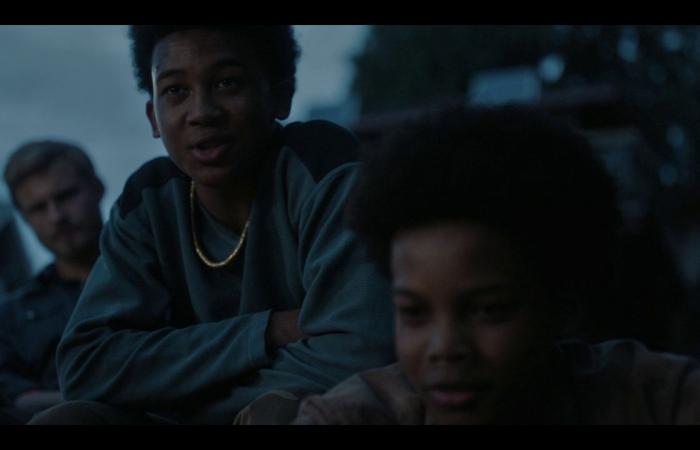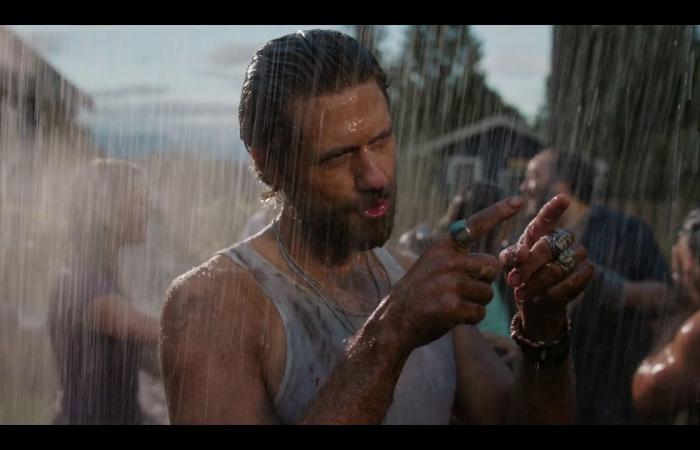Earth Abides // Saison 1. Episodes 4 et 5. Predators / The Return.
Episodes 4 and 5 of Earth Abides mark a significant turning point in the series, bringing deeper conflicts and increased tension. However, despite these efforts, these two episodes leave a mixed impression, mixing promising moments and narrative inconsistencies. Let's come back to this double episode entitled Predators et The Return. Since its beginnings, Earth Abides stood out for its realistic approach, avoiding the usual apocalyptic clichés. However, this search for realism sometimes led to a lack of dramatic tension. The previous episodes, although moving, gave the impression that everything was going too well for the survivors. With these new episodes, the series partially corrects this flaw by introducing antagonists and moral dilemmas.
Charlie, the newcomer, perfectly illustrates this shift. Charismatic and useful at first, he quickly becomes a threat to the community. But this transformation, while necessary to add tension, is clumsily executed. His transition from “potential savior” to “caricatural antagonist” is so abrupt that it becomes hardly credible. Another recurring problem in the series is its difficulty in managing the passage of time. We're supposed to be 14 years after the apocalypse, but the series struggles to show it convincingly. The frequent time jumps make it difficult to become attached to the characters and their developments. For example, Ish, seriously injured after a lion attack at the end of the previous episode, is miraculously restored to his feet thanks to Molly.
However, the latter admits to being only a pseudo-doctor. This plot, which could have been an interesting arc, is dispatched in a few scenes, depriving the viewer of any emotional immersion. The heart of these two episodes lies in the introduction of Charlie and his group, who have come to help the community solve a vital problem: water. If the idea of exploring the tensions linked to collective survival is relevant, its execution leaves something to be desired. Charlie is presented as an ambiguous character from the start, with his talk of survival of the fittest and his domineering attitudes. Unfortunately, his characterization lacks subtlety. In a few scenes, he goes from a potentially complex leader to a villain without nuance. His aggression towards Evie, although tragic, seems above all to be a narrative pretext to justify his elimination.
The decision to kill Charlie also raises questions. Ish, usually careful and thoughtful, chooses a brutal method to finish him off: beating him to death with a hammer. This scene could have been a tipping point for the character, exploring the moral consequences of his action. However, the series skims over this reflection, preferring to quickly move on to something else. Worse yet, some members of Charlie's group are allowed to remain in the community after his death. This creates a narrative inconsistency: how can survivors trust those who were loyal to such a toxic man? This decision weakens the credibility of the characters' choices and dilutes the emotional impact of this arc.
At the same time, the series introduces a subplot around Alex, Ish's son, who becomes increasingly jealous of his brother Joey. This dynamic could have enriched the story by exploring family tensions in a post-apocalyptic world. But Alex's behavior is so selfish that it becomes difficult to feel empathy for him. His initial support for Charlie, followed by his irrational anger towards his father, reinforces his role as an unsympathetic character. As the survivors finally seem to overcome their internal conflicts, the series reintroduces the virus that caused the apocalypse. This threat, although crucial, is barely explained. Why does she reappear? Why are some affected and others not? The series seems to use the virus as a simple narrative tool to generate tension, with no real logic behind it.
This plot, however, raises interesting questions, particularly about Ish's guilt. The latter, consumed by his violent act towards Charlie, sees the resurgence of the virus as divine punishment. This exploration of guilt would have deserved more time on screen, but, once again, the series prefers to accelerate towards the sequel. The double episode ends on a tragic note: Heather returns alone after an expedition, revealing that Raif, her companion, is dead. This moment, which is supposed to be emotional, falls flat due to the lack of character development. Raif, barely mentioned in previous episodes, never had the opportunity to establish himself as an endearing character, making his death almost insignificant.

These episodes 4 and 5 of Earth Abides show that the series has the potential to explore powerful themes, like survival, morality and group dynamics. However, pacing issues, excessive time jumps, and sometimes clunky writing hamper their impact. If Earth Abides really wants to captivate its audience, it will have to better balance its plots and offer more nuanced characters. Otherwise, it risks losing what made its initial strength: a poignant realism and a sincere exploration of humanity in the face of adversity. For now, the series seems stuck between its ambitions and its narrative weaknesses.
Note : 3/10. In short, the series cannot overcome its own pacing, its clumsy writing and its excessive time jumps.
Coming soon in France








